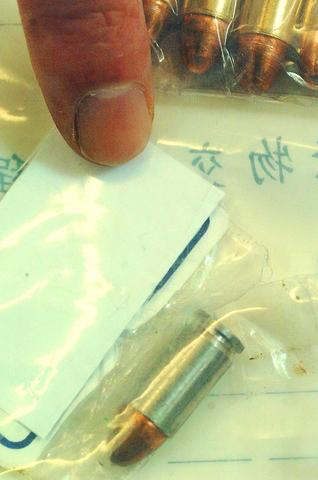Police announced yesterday that a Tainan-based ecstasy dealer was the maker of the two homemade bullets used in the shooting of President Chen Shui-bian (陳水扁) and Vice President Annette Lu (呂秀蓮) on March 19.
Criminal Investigation Bureau (CIB) Commissioner Hou You-yi (侯友宜) identified the suspect as Tang Shou-yi (唐守義) during a press conference called by the Supreme Prosecutors' Office.

PHOTO: SEAN CHAO, TAIPEI TIMES
"It is him. We are very sure about that," Hou said. "The evidence says it all."
The discovery of the bulletmaker is the biggest breakthrough yet in the assassination probe.
Hou said Tang first came to investigators' attention on Aug. 15, when he was arrested by Kaohsiung police during an illegal arms sale.
On Oct. 12, Tainan Prosecutor Wang San-jung (王森榮) led a team of police officers on a raid of Tang's residence, where he reportedly produced illegal weapons.
During the raid investigators discovered a blueprint of a homemade bullet. They said the drawing exactly matched the two bullets from the shooting.
Wang's request that Tang be detained was immediately granted by judges. He remains in custody.
Hou said the unusual structure of the homemade bullets that Tang sold matched those used during the assassination attempt, including the distinctive tool and machine marks.
The CIB displayed two pictures at the press conference: a close-up shot of the two bullets and a photo of the blueprint.
"We wanted to avoid any possibility that the suspect might destroy evidence. That is why we held back the photos until today," Hou said.
Investigators discovered that another maker of homemade bullets and guns, Chang Hsin-chieh (張新潔), had worked with Tang in the past. Chang died of a drug overdose on June 27 last year.
Officials said to make their bullets, Tang and Chang would buy copper or lead weights used by fishermen at tackle shops and melt the weights to fill the molds they had made.
To avoid attracting attention, the molds did not resemble bullets. The molded pieces were then cut and shaped into bullets.
The gunpowder used in the bullets came from toy caps sold at toy and stationary stores.
Officials said that to make guns, Tang and Chang would buy toy pistols and then refine or replace the bores and barrels.
The CIB's investigation showed that Tang and Chang had produced more than 40 pistols and 1,000 bullets since January last year.
Hou said Tang had been careful to try to cover his tracks.
"He stopped producing the kind of bullets used during the shooting but otherwise his business was not interrupted by the case," Hou said.
"The most difficult part now is to find out who bought the bullets from them. They had a lot of clients so it will take time for us to search for them," Hou said.
CIB officers are still screening Tang's cellphone records going back to January last year in the hopes of identifying the March 19 shooter.
"We are closingr in on the end of our investigation since we started from zero," Hou said. "As usual, we are quite confident that we will close the case soon."

DAREDEVIL: Honnold said it had always been a dream of his to climb Taipei 101, while a Netflix producer said the skyscraper was ‘a real icon of this country’ US climber Alex Honnold yesterday took on Taiwan’s tallest building, becoming the first person to scale Taipei 101 without a rope, harness or safety net. Hundreds of spectators gathered at the base of the 101-story skyscraper to watch Honnold, 40, embark on his daredevil feat, which was also broadcast live on Netflix. Dressed in a red T-shirt and yellow custom-made climbing shoes, Honnold swiftly moved up the southeast face of the glass and steel building. At one point, he stepped onto a platform midway up to wave down at fans and onlookers who were taking photos. People watching from inside

A Vietnamese migrant worker yesterday won NT$12 million (US$379,627) on a Lunar New Year scratch card in Kaohsiung as part of Taiwan Lottery Co’s (台灣彩券) “NT$12 Million Grand Fortune” (1200萬大吉利) game. The man was the first top-prize winner of the new game launched on Jan. 6 to mark the Lunar New Year. Three Vietnamese migrant workers visited a Taiwan Lottery shop on Xinyue Street in Kaohsiung’s Gangshan District (崗山), a store representative said. The player bought multiple tickets and, after winning nothing, held the final lottery ticket in one hand and rubbed the store’s statue of the Maitreya Buddha’s belly with the other,

‘NATO-PLUS’: ‘Our strategic partners in the Indo-Pacific are facing increasing aggression by the Chinese Communist Party,’ US Representative Rob Wittman said The US House of Representatives on Monday released its version of the Consolidated Appropriations Act, which includes US$1.15 billion to support security cooperation with Taiwan. The omnibus act, covering US$1.2 trillion of spending, allocates US$1 billion for the Taiwan Security Cooperation Initiative, as well as US$150 million for the replacement of defense articles and reimbursement of defense services provided to Taiwan. The fund allocations were based on the US National Defense Authorization Act for fiscal 2026 that was passed by the US Congress last month and authorized up to US$1 billion to the US Defense Security Cooperation Agency in support of the

‘COMMITTED TO DETERRENCE’: Washington would stand by its allies, but it can only help as much as countries help themselves, Raymond Greene said The US is committed to deterrence in the first island chain, but it should not bear the burden alone, as “freedom is not free,” American Institute in Taiwan Director Raymond Greene said in a speech at the Institute for National Defense and Security Research’s “Strengthening Resilience: Defense as the Engine of Development” seminar in Taipei yesterday. In the speech, titled “Investing Together and a Secure and Prosperous Future,” Greene highlighted the contributions of US President Donald Trump’s administration to Taiwan’s defense efforts, including the establishment of supply chains for drones and autonomous systems, offers of security assistance and the expansion of